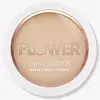EX1 Cosmetics Invisiwear Compact Powder Versus Flower Beauty by Drew Light Illusion Perfecting Powder
What's inside
What's inside
 Key Ingredients
Key Ingredients

 Benefits
Benefits

No benefits
 Concerns
Concerns

 Ingredients Side-by-side
Ingredients Side-by-side

Talc
AbrasiveMica
Cosmetic ColorantDimethicone
EmollientOctyldodecyl Stearoyl Stearate
EmollientNylon-12
Zinc Stearate
Cosmetic ColorantSilica
AbrasiveCaprylyl Glycol
EmollientHdi/Trimethylol Hexyllactone Crosspolymer
Polymethyl Methacrylate
Phenoxyethanol
PreservativeLauroyl Lysine
Skin ConditioningPotassium Sorbate
PreservativeTrimethylsiloxysilicate
EmollientHexylene Glycol
EmulsifyingCI 77288
Cosmetic ColorantCI 77492
Cosmetic ColorantCI 77491
Cosmetic ColorantCI 77499
Cosmetic ColorantTalc, Mica, Dimethicone, Octyldodecyl Stearoyl Stearate, Nylon-12, Zinc Stearate, Silica, Caprylyl Glycol, Hdi/Trimethylol Hexyllactone Crosspolymer, Polymethyl Methacrylate, Phenoxyethanol, Lauroyl Lysine, Potassium Sorbate, Trimethylsiloxysilicate, Hexylene Glycol, CI 77288, CI 77492, CI 77491, CI 77499
Talc
AbrasiveAluminum Starch Octenylsuccinate
AbsorbentSynthetic Fluorphlogopite
Nylon-12
Magnesium Myristate
Octyldodecyl Stearoyl Stearate
EmollientDiisostearyl Malate
EmollientHdi/Trimethylol Hexyllactone Crosspolymer
Water
Skin ConditioningHydrogenated Polyisobutene
EmollientPhenoxyethanol
PreservativeCaprylyl Glycol
EmollientDimethicone
EmollientBenzyl Alcohol
PerfumingHexylene Glycol
EmulsifyingSilica
AbrasiveDehydroacetic Acid
PreservativeCI 77891
Cosmetic ColorantIron Oxides
CI 77742
Cosmetic ColorantTalc, Aluminum Starch Octenylsuccinate, Synthetic Fluorphlogopite, Nylon-12, Magnesium Myristate, Octyldodecyl Stearoyl Stearate, Diisostearyl Malate, Hdi/Trimethylol Hexyllactone Crosspolymer, Water, Hydrogenated Polyisobutene, Phenoxyethanol, Caprylyl Glycol, Dimethicone, Benzyl Alcohol, Hexylene Glycol, Silica, Dehydroacetic Acid, CI 77891, Iron Oxides, CI 77742
Ingredients Explained
These ingredients are found in both products.
Ingredients higher up in an ingredient list are typically present in a larger amount.
Caprylyl Glycol is a humectant and emollient, meaning it attracts and preserves moisture.
It is a common ingredient in many products, especially those designed to hydrate skin. The primary benefits are retaining moisture, skin softening, and promoting a healthy skin barrier.
Though Caprylyl Glycol is an alcohol derived from fatty acids, it is not the kind that can dry out skin.
This ingredient is also used as a preservative to extend the life of products. It has slight antimicrobial properties.
Learn more about Caprylyl GlycolDimethicone is a type of synthetic silicone created from natural materials such as quartz.
What it does:
Dimethicone comes in different viscosities:
Depending on the viscosity, dimethicone has different properties.
Ingredients lists don't always show which type is used, so we recommend reaching out to the brand if you have questions about the viscosity.
This ingredient is unlikely to cause irritation because it does not get absorbed into skin. However, people with silicone allergies should be careful about using this ingredient.
Note: Dimethicone may contribute to pilling. This is because it is not oil or water soluble, so pilling may occur when layered with products. When mixed with heavy oils in a formula, the outcome is also quite greasy.
Learn more about DimethiconeThis ingredient is a powder used to improve texture, slip, and give products a silky texture.
Hexylene Glycol is a surfactant. Glycols are a class of alcohols. Hexylene Glycol is a surfactant and emulsifier.
As a surfactant, Hexylene Glycol helps gather dirt and oil on your skin to be washed away.
As an emulsifier, Hexylene Glycol helps keep water and oil together. This prevents them from separating in a product. Hexylene Glycol also thins out the texture of a product by lessening viscosity.
Hexylene Glycol has a small molecular weight.
Learn more about Hexylene GlycolNylon-12 is a polymer. It is derived from 12-aminododecanoic acid, an omega-amino fatty acid
According to a manufacturer, it is a talc substitute. Like talc, nylon-12 gives products a satin feel. The manufacturer also claims this ingredients does not block pores and has moderate oil absorption.
This ingredient may not be reef-safe.
Learn more about Nylon-12Octyldodecyl Stearoyl Stearate is created from stearic acid.
It is an emollient and thickens the lipid (oil) portion of a product. Due to its emollient properties, it may not be fungal-acne safe.
Phenoxyethanol is a preservative that has germicide, antimicrobial, and aromatic properties. Studies show that phenoxyethanol can prevent microbial growth. By itself, it has a scent that is similar to that of a rose.
It's often used in formulations along with Caprylyl Glycol to preserve the shelf life of products.
Silica, also known as silicon dioxide, is a naturally occurring mineral. It is used as a fine, spherical, and porous powder in cosmetics.
Though it has exfoliant properties, the function of silica varies depending on the product.
The unique structure of silica enhances the spreadability and adds smoothness, making it a great texture enhancer.
It is also used as an active carrier, emulsifier, and mattifier due to its ability to absorb excess oil.
In some products, tiny microneedles called spicules are made from silica or hydrolyzed sponge. When you rub them in, they lightly polish away dead skin layers and enhance the penetration of active ingredients.
Learn more about SilicaTalc is a clay mineral. It helps absorb moisture and improve the texture of products. Like other types of clay, Talc can have a slight exfoliating effect on skin. Talc can be added to increase the volume of products.
Some Baby powders are made by combining talc with corn starch. The word "talc" comes from Latin and originates from Arabic. Talc is a mineral commonly found throughout the world.
If you have any concerns about using talc, we recommend checking out the FDA's official page.
Learn more about Talc